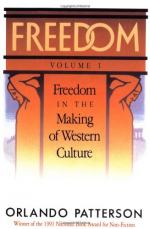|
This section contains 424 words (approx. 2 pages at 400 words per page) |

|
Chapter 4 Summary and Analysis
Eventually the differing views of freedom lead to social conflict and upheaval. A new class arises that is not dependent on the aristocracy. These former slaves become successful and prosperous causing resentment among the still-oppressed slaves. A second factor has to do with the spread of literacy and the development of a legal written code, which Patterson sees as "a strategic class error" (p. 65) because it results in a standard against which things can be measured.
Slavery is also a factor contributing to the social conflict of this time. Debtors are sold into slavery, sometimes foreign slavery. These slaves are repurchased and repatriated during Solon's time. Social reforms, like Solon's seisochtheia, for the abolishment of debt, debt bondage and enslavement for debt, are put into place to try to alleviate the social strife. This leads to a preoccupation among citizens regarding...
(read more from the Chapter 4 Summary)
|
This section contains 424 words (approx. 2 pages at 400 words per page) |

|




